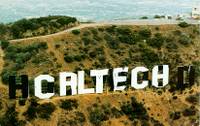Science and Faith: Mutually Assured Destruction?
There has been much debate in the b'sphere over the last week with regard to the relative roles of science and faith in our lives and especially in our classrooms. This after court cases in WI and GA that essentially seek to replay the Scopes Monkey trial.
In the GA case, the Cobb county school district had placed thousands of stickers on biology textbooks in"an effort to get past conflict and to teach good science." However, the ACLU is now challenging that decision based on the idea that the placement of stickers reading:
"This textbook contains material on evolution. Evolution is a theory, not a fact, regarding the origin of living things. This material should be approached with an open mind, studied carefully and critically considered."indicates an endorsement of religion, and therefore violates separation of church and state.
I just don't know where to begin. First of all, both Cobb county and the ACLU are wrong. And right. Evolution is a theory. BUT evolution is also a fact.
The theory of evolution, as postulated by Darwin, is that all organisms arise from more primitive organisms, and that as creatures evolve, they become better adapted to fit in their own niche, where niche indicates habitat, symbiosis (where applicable), and predator/prey interactions. Therefore all life is interrelated and arose from a common ancestor shared with even the most primitive prokaryote.
The facts of evolution are that evolution is ongoing. Evolution is the adaptation of species to their environment and is a well-documented, active process usually described as "the survival of the fittest". I could cite several examples of this, including the marine iguana of the Galapagos and the dome-shelled or saddle-backed varieties of Galapagos Tortoise. But my favorite example is the British Pepper Moth. In a census of pepper moths conducted by Oxonian scientists before the Industrial revolution, the majority of these moths were found to be very white with tiny black spots on the wings (as if they had been sprinked with pepper). Many years later, another census of these creatures found them to have significantly more black spots than their ancestors. The reason? Because Pepper Moths live on the walls and roofs of buildings and in the tops of trees. Before the IR, they could camoflauge themselves on the white walls of buildings or light colored bark of some trees. After the IR, these buildings and trees were significantly darker due to soot deposited from early factories. Darker moths were less likely to be obvious prey for passing birds, and therefore were more likely to survive and pass their genes along than whiter moths.
Another great example of evolution in action is the FACT that we humans share 99.5% of our DNA sequence with Pan paniscus, the Bonobo Chimpanzee (click on the link to meet Kanzi, a remarkable guy that I've met) and about 99% with Pan troglodytes, the Common Chimpanzee.
Yes, a theory is open to debate. Yes, parts of it are reassessed every time we add something to the fossil record (the new hominid find in Indonesia, for example), but somethings we know. For example, we know that getting a flu shot prevents getting the flu (Sorry, Gandelman), we know that regulating your blood sugar level keeps you alive longer if you are a Diabetic, and we know that DNA is the recipe for you and me and the Elephants and the Trees and the Bacteria on the sink.
This is something that Mitch touches on here. It's the difference between asking a question you can answer and a question you can't answer. Sadly enough, it's a distinction that I wasn't taught until Graduate School, and one that most people would do well to grasp in these days of my politics and your religion and Black and White and 60,000,000 morons.
We can ask: Are humans related to mice? When did humans arrive in North America? Where do we come from?
Question 1 and 2 are questions we can answer, Question 3 is not. That doesn't make it a rhetorical question, though. It just means we can't answer it now, we don't posess the technology, and we have theories, which are open to revision.
But that poses an interesting problem for those of us who are Christians and who are scientists. What are we to believe? You might think that this is not an issue, that most scientists are not particularly religious, but in my experience, the opposite is frequently the case. Albert Einstein famously said "God does not play dice" with regard to the Universe, and Stephen Hawking has stated more than once that "Science does not disprove the existence of God". Many great scientists and mathematicians are deeply religious, and their drive to understand the nature of the universe comes from their desire to understand the great and mysterious works of God.
So what about evolution? I can only say for myself that one theory doesn't preclude the other story. The fossil record, to date, supports the order of creation according to Genesis for the most part, except for the timeline, and with a few notable additions (dinosaurs, for example, are nowhere to be found in the Bible. Ask any 7 year old boy). If you see creation in Genesis as a story, or even as an allegory, it's not hard to reconcile theory and story, but if you are a literal believer, that is, if you believe that the entire universe was created in 7 EARTH days, you've got more of a problem. Of course, then you probably also believe that Methuselah was also 900-something when he died, which I have never been able to understand.
But where does any of this leave science education? Do we teach children that evolution is a theory with out mentioning creation? Can we avoid the subject altogether?
The most obvious answer is for the last: of course we can't. Our students are already the dumbest in the western world, depending on which test results you believe. But then some would have you believe that we must go about the task of teaching our students without stepping on anyone's toes. This is patently false, and that should be dead obvious. Evolution in the origins of life is the only issue that raises so much controversy based on religion. Certainly there have been a lot of debates about various forms of sex ed based on religion and morals, but no one disputes the veracity of the information being taught based on religion. And no one raises a stink when we teach our children that antibiotics will help an ear infection or strep throat, even though Christian Scientists believe that prayer alone can heal.
Furthermore, I find it disturbing that we CAN teach children about adaptation, about sexual selection, and about "survival of the fittest", yet according to the state of GA we have to tell them that it's possible that this phenomenon spontaneously generated a couple of hundred years ago, and fossils of dinosaurs with wings and beaks and feathers don't tell us that birds developed from dinosaurs. This idea of educating around the offense of everyone doesn't leave us with much to put in the textbooks.
It seems to me that this line of reasoning has only one possible outcome: that kids who learn that science is only partly true and that faith is only partly important will learn nothing about either science or faith, and especially nothing about how we use both science and faith as guiding principles in our lives, regardless of what we believe in.
(h/t to Deb and Juliette for links to some of the works cited above)


















6 Comments:
Caltechgirl, thank you for an intelligent post on science and faith. I had nearly given up on hoping to find such in the blogosphere, where usually it's two cliques, FaithNotScience vs. ScienceNotFaith, screaming at each other across the table like purple-faced idiots, and from my perspective both sides are speaking the same language, and it ain't the language I'm speaking.
Then again, I'm an ordained Presbyterian minister; like many in my faith tradition, I've always been just fine with evolution; and I bounced around in the world of graduate mathematics for several years before I went off to seminary. One of the minor ironies of the blogosphere is that BothFaithAndScience individuals like me don't even register on the radar screen of many of the livid folks on either side of this (to my mind) needless dispute. Oh well, sometimes it's fun being invisible. Other times it's annoying being invisible. :)
BTW... as an alumnus of that school up in Durham, I must respectfully dissent from you on one point: DUKE RULES! :)
Though I will admit that Franklin Street and environs is the best place to hang out and hunt for used books...
Thanks for your comment. I'm glad you thought it was intelligent, since I was afraid it rather disintegrated into a rant :)
And as for Dook, I suppose I can forgive you! Drop by often :)
Actually, I am quite serious. The process of evolution, that is, adaptation, is a well documented phenomenon.
You have made the exact mistake I was trying to point out, lumping together the explanatory theory and the active process. The theory is indeed just a theory, but adaptation is real.
First, thanks for the link.
I actually didn't mention Evolution at all in my post - although I figured people would think of that on their own.
I am for teaching Evolution in schools - it is the best theory we have. But I am also okay with telling kids that - "it's the best theory we have". Since, in the end, that all it is.
The fact of the matter is that for 99.99% of us, where we think we came from will has no effect on getting a job, our salary level, contributing to society, etc. (the other 0.01% are acheologists, university profs and the like), so whatever is taught is really meaningless. In the mean time we have kids graduating who can't read or do basic math.
My point is that adaptation and evolution are synonyms for the same ongoing process. Sorry if that wasn't clear :)
Very well put. The synthesis of science and religion has long been a difficult process, in part because both tend to demand absolute adherence to their respective beliefs.
What is interesting is this: If my memory serves me right, the early fundamentalist movement in the United States was NOT against evolution per se. Rather, that dislike for evolution came about as a result of the efforts of people like William Jennings Bryan (a fundamentalist Democratic Presidential candidate). They felt that the theory of Social Darwinism that came about as a result of the theory, ands its application to World War I, was proof that evolution could not be "Christian." Literalism also had a part to play for some, like Bryan.
Post a Comment
<< Home